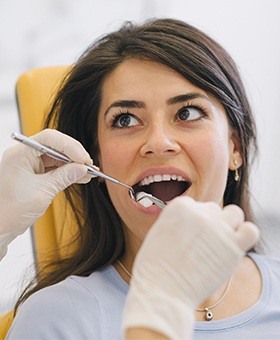While it’s never Dr. Lively’s first choice, sometimes the best course of action he can take to protect and preserve a person’s oral health is to remove a tooth. This is often the case when severe dental damage or decay is present. He understands that this procedure can make a lot of patients feel nervous, which is why he always takes the time to answer questions beforehand, and sedation dentistry can help eliminate any lingering nerves as well. If necessary, he can also quickly replace the tooth to minimize any time spent with an incomplete smile.
Tooth Extractions – Mangum, OK
Skilled & Pain-Free Tooth Removal

Why Choose Us for Extractions?
- Some wisdom tooth extractions performed in-house
- Sedation dentistry available
- Hometown dentist with 20+ years of experience
Why You Might Need a Tooth Extraction

- One of your teeth has a cavity too large to be restored with a filling or crown
- The tooth has experienced so much trauma that it cannot be put back together
- An advanced infection has damaged the bone needed to support a tooth
- More room is needed in the mouth to help a new denture fit properly
What to Expect During Tooth Extraction

Dr. Lively can provide two different types of extractions:
- Non-surgical: This is used when a tooth has fully or mostly erupted into the gum line. Dr. Lively will simply numb the tooth and rock it back and forth until it slips out on its own.
- Surgical: If a tooth is still stuck within the gums (which is often the case with wisdom teeth), Dr. Lively will numb the treatment area and then eliminate any gum/bone tissue that is covering the tooth. They’ll then remove the tooth and close the treatment site using self-dissolving sutures.
What to Expect After an Extraction

A little soreness in the mouth is normal after an extraction, but this should go away after a few days. A patient will be instructed to avoid drinking with a straw, spitting, and being physically active for the first 24 hours, as this can interfere with the blood clotting in the area, which is essential for proper healing. We’ll also recommend that they stick to a soft food diet initially. After about a week or so, a patient’s mouth should feel completely normal, and they will be able to resume their regular diet and activities.

